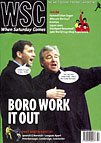 Peterborough have the money and the ground, Cambridge have reached greater heights on the pitch. Simon Knott surveys the state of rivalry in the fenlands
Peterborough have the money and the ground, Cambridge have reached greater heights on the pitch. Simon Knott surveys the state of rivalry in the fenlands
Down in the Fen country things are stirring, as Cambridgeshire’s two League clubs face up to the post-Bosman world. And about time. Just as Cambridge’s ground is an object of ridicule for Boro fans, so Peterborough’s lack of achievement raises a hearty guffaw down at the Abbey Stadium. Despite several solid cash injections over the years and aspirations in abundance, Posh have never been able to live their dreams, and it has been galling for Boro fans to witness Cambridge’s league and cup exploits over the past ten years or so. For the Cambridge faithful, the Abbey has been a cross to bear for longer than that. But planning permission for redevelopment has at last been obtained, and work should begin in the summer.
he fight for the future has had a number of spin-offs for both clubs, not least increased enthusiasm and involvement by fans at all levels. And it works both ways. At Cambridge, the internet message board and mailing list are among the liveliest in the league, and directors put in regular appearances. When the independent Cambridge Fans United was formed at the start of the season, manager Roy McFarland was one of the first to join, even paying his own subscription.
Why Cambridge Fans United? “It started because of the publicity that arose when the Football Trust announced the formation of Supporters Direct, aimed at encouraging fans to take an active involvement in their clubs,” says co-organiser Nick Pomery. “I had got annoyed about our planning debacle and, as a small shareholder, was concerned enough to have started thinking about how the fans could help to fund part of the redevelopment.”
Contacts were made with the official Cambridge United Supporters Club, and the trust grew from there. The aim is to raise £250,000 in two years, which will be carefully co-ordinated so it doesn’t conflict with the club’s own fund-raising activities. Although independent, it is a mark of the current happy state of relations between club and fans that the manager was keen to become involved.
McFarland has a tough job on his hands, balancing the club’s shoestring budget while building a competitive team. You might think that Barry Fry has it easier up the A1, where chairman Peter Boizot lavishes his pizza restaurant profits on the club. Not so; Fry just can’t seem to do the business. Where McFarland is hugely popular with the Us fans, Fry is barely tolerated by the Posh faithful. Within living memory, they reached the First Division for the first time in their history. With the taste of blood still in their mouths, they don’t easily tolerate Fry’s platitudes. Cambridge fans, by contrast, fear that McFarland will be tempted elsewhere, and every sacking of a manager in the top two divisions is greeted with apprehension.
Cambridgeshire is a place apart. On Saturday afternoons, resilient fans head into the wind out of stubborn, faceless fenland towns, and off the hard estates to the north and east of both cities. Posh have a higher profile in their community, but then there isn’t much else in Peterborough to compete with them. Their catchment is larger too, and Cambridge have the added problem of the droves of cars that head down the M11 to Arsenal and Tottenham every weekend.
Both places have a large number of people whose roots lie elsewhere. Peterborough (the slightly larger of the two) was a designated New Town and its population expanded some fourfold in 30 years, while Cambridge has seen the hot-housing of the local hi-tech economy, which attracted thousands of professionals. And, of course, it also has the university.
Not surprisingly, of the two football clubs Peterborough have done rather better out of this than Cambridge, who struggle to make their presence felt on the new executive estates. They also, unsurprisingly, are not a major topic of conversation in the courts of the university, few of whose 10,000 students are familiar faces at the Newmarket Road End. Admiring glances are cast at places like Sunderland, where the club seems totally integrated into the local community.
Both clubs know they will never be a Sunderland. But they can aspire to being an Ipswich. It would be false to suggest there was any real rivalry between the Cambridgeshire clubs and their Premiership neighbour. But there isn’t half a lot of irritation. Every time you turn on the local news, Ipswich are there, regularly filling their 20,000-plus Portman Road stadium. What the town of Ipswich has in common with its two Cambridgeshire cousins is a similar catchment area, a similar population (in fact, Ipswich is the smallest of the three in the most recent mid-term census) and a relatively recent foundation. What they do not share, of course, is the football club’s huge success.
For the meantime, though, Peterborough and Cambridge will continue to be concerned mostly with each other. Their antagonism is as intense and irrational as any – the other feud between Posh and Northampton cannot compare, nor the Us’ occasional slanging matches with the likes of Leyton Orient. And once again, as so often, we find ourselves in the same division. For Cambridgeshire football fans unseduced by Premiership glamour, there is only one fixture worth waiting for.
From WSC 168 February 2001. What was happening this month
Only one word to say to that, "Cobblers" !!